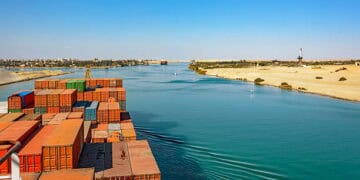The UN Conference on Trade and Development (UNCTAD) has published a report titled “Navigating Troubled Waters: The Impact of Shipping Route Disruptions on Global Trade in the Red Sea, the Black Sea, and the Panama Canal.” The report highlights how recent attacks on Red Sea shipping, coupled with existing geopolitical and climate-related issues, are reshaping global trade routes.
Disruption in Key Maritime Routes
Recent attacks on shipping in the Red Sea have severely disrupted maritime trade routes through the Suez Canal, impacting global trade. This disruption compounds existing challenges in the Black Sea due to the conflict in Ukraine, leading to shifts in oil and grain trade routes.
Additionally, the Panama Canal, a vital link between the Atlantic and Pacific Oceans, faces its own challenge of diminishing water levels. Concerns about long-term supply chain resilience have been raised due to these dwindling water levels, highlighting the fragility of global trade infrastructure.
UNCTAD estimates a 42% decrease in transits passing through the Suez Canal compared to its peak. Major players in the shipping industry have temporarily suspended Suez transits, resulting in significant declines in container ship transits, container carrying capacity, tanker transits, and gas carriers. Similarly, transits through the Panama Canal have dropped by 49% compared to its peak.
Economic and Environmental Costs
The uncertainty surrounding Suez Canal transits and the rerouting of ships around the Cape of Good Hope are imposing economic and environmental costs, as well as additional pressure on developing economies.
Since November 2023, there has been a significant increase in average container spot freight rates, with rates more than doubling from Shanghai to various destinations. Rerouting ships and seeking alternative routes lead to longer travel distances, higher trade costs, insurance premiums, and increased greenhouse gas emissions.
Significance for Regional Economies
The Panama Canal plays a crucial role in the foreign trade of countries on the West Coast of South America, with countries like Chile, Peru, and Ecuador heavily dependent on it. Similarly, East African countries rely significantly on the Suez Canal for their foreign trade, with Djibouti, Kenya, Tanzania, and Sudan among the most affected.
Potential Economic Implications
Prolonged disruptions in container shipping pose far-reaching economic implications, threatening global supply chains and potentially causing delays, higher costs, and inflation. Higher freight rates could lead to increased energy prices, impacting energy supplies and food prices globally.
Impact on Climate
Disruptions in key trade routes have resulted in increased vessel speeds to maintain schedules, leading to higher fuel consumption and greenhouse gas emissions. This rise in fuel consumption could contribute to a substantial increase in greenhouse gas emissions.
Vulnerability of Developing Economies
Developing countries are particularly vulnerable to these disruptions, emphasizing the need for swift adaptations from the shipping industry and robust international cooperation. Collective efforts are required to address the exposure of global trade to geopolitical tensions and climate-related challenges and to support countries vulnerable to these shocks.
Stay current with supply chain report news at The Supply Chain Report. For international trade tools, see ADAMftd.com.
#UNCTAD #ShippingDisruptions #GlobalTrade #RedSea #BlackSea #PanamaCanal #SupplyChainResilience #MaritimeTrade #GeopoliticalTensions #ClimateImpact #DevelopingEconomies #FreightRates #TradeRoutes #EconomicImpact #EnvironmentalCosts















